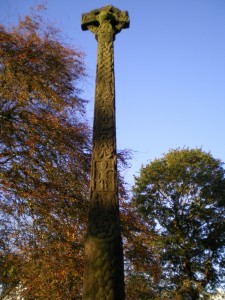February 19, 2014, by Judith Jesch
The meaning of Ragnarok
The Jorvik Viking Centre is currently advertising its annual Viking Festival by claiming that Ragnarok will take place on the 22nd of February this year. Most people are familiar with Ragnarok as the cataclysmic event of Old Norse mythology in which the old gods and their world are destroyed when the forces of evil are unleashed. But is Ragnarok in the future, something to be feared and anticipated, or has it already happened and are we now living in the brave new world that arose from its ashes? Is the myth of Ragnarok a gloomy one, anticipating an unpleasant and inevitable end, or does it envisage a rebirth into a new and better world?
The first element in the word (ragna) is the genitive form of the neuter plural noun regin, a word used of the gods, but not actually meaning ‘gods’. It is a more abstract concept that means ‘powers’, perhaps ‘deciding, ruling powers’. The nature of these powers is not clear: are they all of the gods collectively, or just some of the gods, or do they include other, unnamed and unknown, forces?
The main reference works for Old Norse will tell you that the sources employ two different words for the second element of Ragnarok. The oldest texts use rök, ‘doom’ or ‘fall’, which suggests a decisive end to the might of the ‘powers’. Snorri Sturluson’s Edda, however, a thirteenth-century Icelandic retelling of the myths, uses røkkr, ‘dusk’ or ‘darkening’. (This is the source for Wagner’s Götterdämmerung ‘Twilight of the Gods’.) Such a concept suggests a less final event, one that is cyclical and with the possibility of the return of light and therefore might. Scholars have assumed either that Snorri misunderstood the original term or that he reinterpreted it to accord with his own view of Norse mythology, involving a rebirth of the world into the new dispensation of Christianity.
 However, an article published in 2007 by Haraldur Bernharðsson of the University of Iceland made a strong case for the second element of Ragnarok in fact representing two closely-related words, røk(k) and røk(k)r.* Both have the same meaning, ‘twilight’, but in a more complex sense than that envisaged by Wagner and others. Like English ‘twilight’, røk(k) and røk(k)r can mean either the transition from light to darkness or from darkness to light. Haraldur suggests therefore that the original meaning of Ragnarok was never that of a decisive ending, but of a beginning, a ‘renewal of the divine powers’.
However, an article published in 2007 by Haraldur Bernharðsson of the University of Iceland made a strong case for the second element of Ragnarok in fact representing two closely-related words, røk(k) and røk(k)r.* Both have the same meaning, ‘twilight’, but in a more complex sense than that envisaged by Wagner and others. Like English ‘twilight’, røk(k) and røk(k)r can mean either the transition from light to darkness or from darkness to light. Haraldur suggests therefore that the original meaning of Ragnarok was never that of a decisive ending, but of a beginning, a ‘renewal of the divine powers’.
If this meaning goes back to the pre-Christian period, as seems likely, then it sheds a whole new light on those gloomy old Vikings. Their mythology envisaged Ragnarok as a cleansing process, through which the gods could be reborn. This more positive view of Ragnarok would also have suited their Christian descendants (Iceland was converted around the year 1000 AD), who could interpret the renewal as being a rebirth into a whole new dispensation with a whole new kind of divine power. This attractive solution not only revises our understanding of the Viking world-view, but also explains how the story could successfully be reinterpreted by Christians, such as the newly-converted Vikings who in the tenth century erected a cross (depicted here) with scenes from both Ragnarok and Christian myth at Gosforth, in Cumbria.
*Haraldur Bernharðsson, ‘Old Icelandic ragnarök and ragnarökkr’, in Verba Docenti. Studies in historical and Indo-European linguistics presented to Jay H. Jasanoff by students, colleagues, and friends, ed. Alan J. Nussbaum, 2007, pp. 25-38.

This would explain why the Easyjet magazine currently has printed as fact that the Vikings believed that the end of the world would come on the 22nd of February. I was wondering where on earth they had got that from!
To me, these are distinctions without a difference. I can easlity equate “Doom of the Gods” with “Twilight of the Gods” because the story does end with evil set loose on the world and the old gods and monsters destoying themselves. I read the Edda back in the 1970s, when the world seemed close to World War III, and was struck by the symbolism of the war and destruction and the great red sun setting into the sea. But then it was also hopeful. There is a new age with the sons of Odin, the previously dead gods Balder and Hoder rising from the dead, etc. Not a big jump for a newly converted Christian to accept, even if they had been a warrior before that.